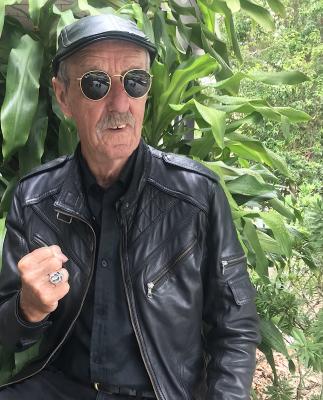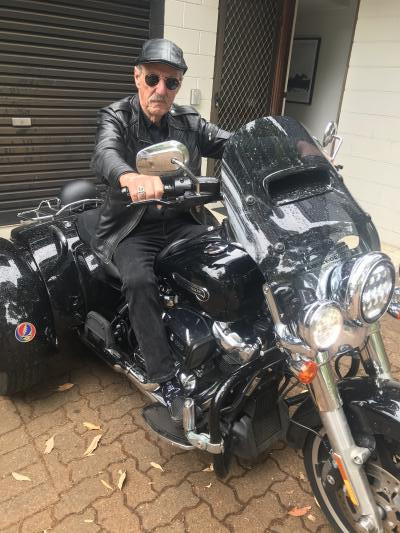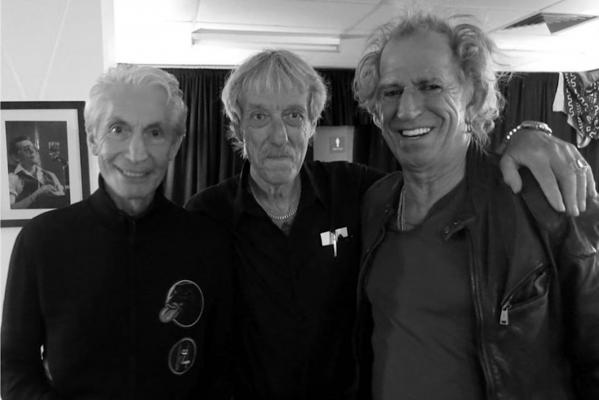“Ladies and gentlemen, the greatest rock and roll band in the world, the Rolling Stones!”
It might be more than half a century, four wives and five battles with cancer since gravel-voiced Sam Cutler belted out that introduction in his Michael Caine East End accent in front of more than 300,000 people in London’s Hyde Park in July 1969, but you can still see the scallywag spirit inside the body that has survived virtually every chemical known to man in 78 years of self-confessed “excessive input”.
But like his old mate Keith Richards, Sam Cutler is still standing, and showing no inclination to lie down yet. Over coffee in Noosa last weekend, he leaned in and confided: “If someone comes along and asks for the band manager, and they say, that’s him over there on the floor, you won’t be the band manager for long. So I paced myself.”
Nevertheless, Sam was front and centre at some of rock’s most out of control moments, including the rowdy Rolling Stones American tour of America in 1969, which culminated in the murder of a fan by a Hells Angel security guard while the band played on at Altamont Speedway near San Francisco, and months spent stoned in the Mojave Desert while he managed the business affairs of the Grateful Dead.
An Australian resident and now citizen for 22 years, and quite possibly the oldest rock and roll notable in Queensland, Sam rode his Harley Davidson trike up from his Brisbane home last weekend to introduce a gig for Noosa’s youngest rock band, The Myths, of whom he is a big fan. Not that Sam needs much encouragement to jump on the Harley and take a spin.
After health issues forced him to give away travelling the country in his live-in bus a few years ago, Sam longed for a Harley, his bike of choice for most of his life. But these were frugal times, and it wasn’t until he jumped on-line and discovered that a guitar given to him by Grateful Dead leader Jerry Garcia was worth at least the price of a trike, that he made the trade.
But we’ve jumped ahead of ourselves, as one tends to do with Sam’s rapid staccato delivery. Let’s go back to the start.Orphaned as an infant during World War Two bombing raids on London, Sam was adopted into the vibrant, highly politicised and musical Cutler family in the East End. His adoptive mother, Dora, was a Communist trade union organizer who instilled in him the value of making things work behind the scenes as opposed to being on centre stage, and when he spent a year in hospital under treatment for an early stomach condition she filled his humble hospital ward with the canon of American mid-century radical literature from Dos Passos to Steinbeck.
Sam became a reader and a thinker, but after completing teacher training at Cambridge, he found he wasn’t cut out for that line of work. He says: “it wasn’t the kids, it was the teachers. They’d say, excuse me, you’re in my chair, and I’d say, what, did you buy it then?” Fortunately, he’d begun running a folk club at the same time, and started to meet rising stars like the young New Yorker Paul Simon and blues legends like Rambling Jack Elliott, who was to become a lifelong friend and a sometime client.
Alexis Korner, sometimes known as the father of British blues despite being Greek, became a special mentor and gave Sam his first job as a tour manager, an unpaid whirlwind five days taking in a festival in Holland and a handful of gigs in Germany. He then got a job with a company called Blackhill, which not only managed Pink Floyd but had won a contract to present concerts in London’s parks. He started out organizing extra bins and other mundane tasks, but was soon the key organizer for huge Hyde Park events featuring Pink Floyd, Jethro Tull, Fleetwood Mac and the new super-group, Blind Faith.
Then came the biggest of the Hyde Park concerts – the Rolling Stones. Sam had become friendly with Mick Jagger, Keith Richards and Charlie Watts, and worked closely with the Stones’ London management in the leadup to the concert. Then, just a couple of days beforehand, the band’s enigmatic but unstable guitarist, Brian Jones, was found floating in the swimming pool of his country estate in suspicious circumstances – Sam is still convinced it was murder. The concert went ahead in an emotion-charged atmosphere, with Mick reciting from Shelley while the audience remained unaware that he and Keith had just sacked Jones from the band.And then Sam Cutler grabbed a mic and boomed out his fabled intro, “Ladies and Gentlemen, the greatest rock and roll band in the world … ”
Sam recalls: “Mick was not happy at all. He pulled me aside after the gig and told me that I’d embarrassed them by calling them the greatest. I retorted, well are you or aren’t you? On tour I did that at every gig, and it was never mentioned again.”
When the Rolling Stones offered him the tour manager’s job for their upcoming US tour, Sam hired a limo and went down to Croydon to see his mum. He recalls: “I told her that they were going to give me a credit card. She didn’t know what that was but when I told her she was appalled that it allowed you to buy something when you didn’t have any money. I said to her, aren’t you at least happy that I’ve got a job? She said: ‘But it’s not a proper job, is it?’ We didn’t talk for a few years after that.”
The wildly successful Stones’ US tour was to end with a free concert at the Altamont Speedway, an event organized by a bunch of well-meaning Haight-Ashbury hippies at a venue no one had heard of. Just as the band was asking, what could possibly go wrong, they discovered that the hippies had hired Hells Angels to do the security for cases of beer.
Over our coffee last weekend, I asked Sam if he was sick of talking about Altamont more than 50 years later. After all, his 2008 book, You Can’t Always Get What You Want, covers it in minute detail. “Not really,” he said. “It’s part of the Faustian contract you make when you go into this line of work. If you don’t want people to be interested in what you do, go and work for the government. The music business is a people business. Jerry Garcia’s motto was keep it real. I try to follow that. The ability to tell rock stars what to do is a strange gift, not unlike a kind of fascist diplomacy, but I had it.”
Within hours of the disaster and tragedy of Altamont, the Stones’ had fled America with their sugar sacks of tour earnings, but Sam stayed on to clean up the mess, and, strangely enough, got a job as manager of the Hells Angels’ favourite band, the Grateful Dead.
Jerry Garcia and his legendary acid rock outfit were tripping on LSD most of every day, including performances, but Sam managed to keep some stability through long desert sojourns, and he became very close to Garcia over his years with the band. He still proudly wears a Dead ring, and his Harley is a Garcia gift from the grave. But on his chest is a tattoo of the Buddha, and a search for spiritual enlightenment was the next stop on his magical mystery tour.
He went to India, met the Bagwan and went off on several spiritual tangents before settling on Buddhism, which remains his guiding light.
In the 1980s, Sam went back to school, completing an honours degree in modern history at the Open University while doing a long stretch on drug charges. Back on the street in the ‘90s, he worked around the edges of the music industry in Europe, lived in Spain and then fell in love with an Aussie girl and followed her here. After years on the road in Australia, he now lives a relatively spartan existence in a Brisbane flat, escaping to the countryside on his trike whenever he can.
The wild years are behind him but the spirit remains. “I don’t do drugs but I’m still chasing tail,” he winks.











